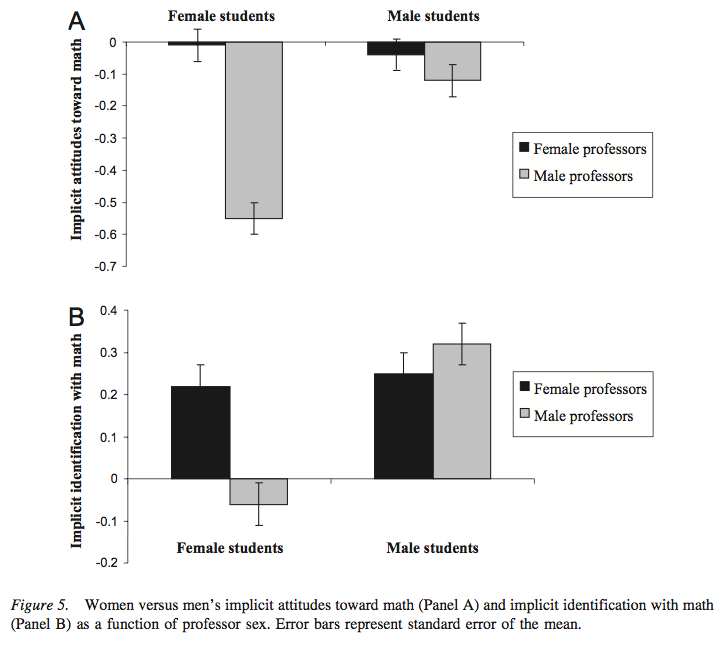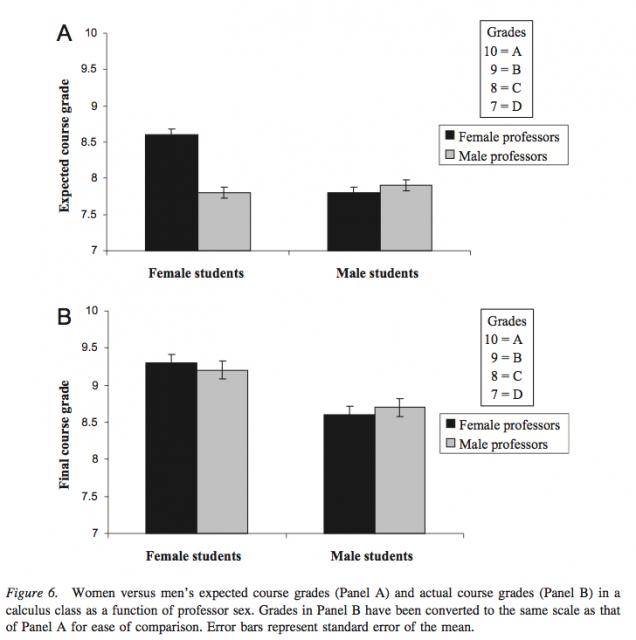Why do I blog about the gender gap in computer science? I am not a research psychologist, and so don't care about the underlying mechanisms for their own sake. Likewise, I do not think of being a computer scientist as a privilege and so do not care about the social justice issues. No, my interest is pragmatic: more computer scientists means more technological progress, which means a better standard of living for me and my children. So to me, everything in this topic boils down to two questions:
- Are we losing potential computer scientists to other fields?
- If so, what can we do about it?
The answer to question (1) seems fairly settled by now: yes. In particular, we're losing women.1 Now, most of my posts on the topic have focused on a question not on the list above: why? This is not because I find the question of 'why' interesting in its own right (I don't) but because it might help me answer question (2). So, I'm very happy to report I've found a glimmer of hope in a paper that verifies the effectiveness of a specific, easily-implemented strategy to keep women in CS.
But first, let's review: There is a big gender gap in Computer Science, but not due to external sexism. Instead, it seems that women leave computer science as a 'choice'-- but this may only be a choice in the strictest sense of the term. Women might be leaving because society places a higher child-rearing burden on them than men, and the tenure clock doesn't account for this. Women might also be leaving the field before they even learn about it, as they learn in junior high that mathematical ability makes them unpopular. Both of these are important, but I've mostly been focusing on women who leave the field (mostly in college) because of signals that CS is masculine and that they don't belong.
This last reason is the most important one for this post. If you believe 'me == female', and everything around you constantly broadcasts the idea that 'CS == male', then it's very hard to emotionally conclude anything other than 'me != CS.' This doesn't affect everybody, of course, but it's hard to stay in a field when you feel like you don't belong.
So what to do about this? We should do what we can to erase 'CS == male' from the environment, of course. It's not true, and there's no good reason for it. But let's be honest: that will take time. We should also look for other things we can do in the meantime, and this paper2 does just that. In particular, it shows that the syllogism above is not inevitable, and that people can be inoculated against it by being exposed to role models like themselves.
This paper actually contains three studies. I'm going to spend most of my time on the last one, but the first two are interesting as well:
- In the first study, female undergraduate STEM3 majors were asked to participate in a psych study run by an upperclassman who is double-majoring in math and psych. Specifically, they were asked to take a math aptitude test (really a math GRE) and do some word-association problems. Half the time the upperclassman was male, and half the time they were female. Did this matter?
- In the second study, female engineering majors were asked to read a short biography of five engineers, answer some questions about the history of engineering, do some hand-eye coordination tasks, and fill out some questionnaires about their interest in engineering. Half the time, the biographies were about men, and half the time they were about women. Did this matter?
In both cases, the answer is 'yes', but in interesting ways. One of the psychological hypotheses of this paper is that though women are affected by the 'STEM == male' zeigeist, much of the effect occurs below conscious awareness. Though the subjects might say and consciously believe that they identify with STEM, therefore, one should check to see if that is true at an implicit level as well. So while the questionnaire measured what the subjects explicitly thought about STEM, the word-association task and the hand-eye coordination tasks revealed what they were implicitly feeling.
With that in mind: The subjects who dealt with the female upperclassman or read the female biographies implicitly believed 'STEM == male' just as much as their counterparts who dealt with the male upperclassman or read the male biographies, and held the same explicit positions vis-a-vis a STEM career. But at the implicit level, they personally believed 'me == STEM' more than their counterparts, and (most tellingly) they tried more problems on the GRE.
So, two things. First, there is more going on in the subjects' attitudes and beliefs than they will be able to articulate. And second, exposure to a female role model doesn't prevent women from believing 'STEM == male' but does help them maintain 'me == STEM' despite this. This is encouraging, but does it apply outside of the laboratory? To answer that, let me let the authors explain the breathtaking scope of the third study:
We [tracked] male and female students from multiple sections of an introductory calculus class: some sections were taught by female professors and some were taught by male professors. Students were tracked from the beginning of the semester (September) to the end (December)... [S]tudents preregistered for specific sections of the class before professors had been assigned to each section. Thus students could not have self-selected into specific sections on the basis of prior knowledge of course professors, including their sex. Second, thanks to unparalleled help from the Department of Mathematics, male and female professors who taught the sections from which we drew our sample were matched in terms of their teaching skills, their stage of career, and their fluency in English... Third, professors teaching these sections were yoked to same-sex teachng assistants to ensure that in the context of the class participants came into contact excusively with female experts in mathematics (i.e., a lecture taught by a female professor and a discussion group led by a female TA) or male experts in mathematics (i.e., a lecture taught by a male professor and a discussion section led by a male TA). All professors and TAs were blind to the real purpose of the study; they were told that the study was on student's interest in math and related majors. Fourth, all course sections had identical material and were tested in the same way regardless of who their professors were. Finally, instructors and TAs graded blind to their students' identity, and grading was shared across sections so that instructors did not necessarily grade their own students' exams.
In addition to all this, the researchers:
- Met with each subject before and after the semester to test explicit and implicit attitudes toward math,
- Were able to acquire the final grade for all the subjects but one,
- And on two different days, they had confederates in the classes themselves counting things like who answered the teacher's questions, who came to office hours or approached the professors for help, and who asked spontaneous questions of their own.
So what did they find?
- The gender of the instructors had basically no effect on the male students.
- If a female student had a male instructor, they hated STEM and didn't identify with it. If they had a female instructor, on the other hand, they implicitly identified with STEM as much as their male counterparts and had the same attitude toward STEM as their male counterparts. Here, a picture can show this better than I can explain:

- The sex of the instructor did not seem to affect anyone's final grade. It did, however, affect the grades predicted by female subjects at the beginning of the class. If the instructor was male, they predicted a high 'D'. If the instructor was female, they predicted mid-C's. But irrespective of their instructors' gender, women outperformed men (a low 'B' vs. a high 'C'). Again, a picture:

-
The gender of the instructor had an impact on classroom dynamics. Warning: none of these numbers necessarily have statistical significance due to small sample sizes, but they're still worth mentioning. The first time confederates sat in classes:
-
More students (both men and women) asked questions of female instructors (22% of students) than male instructors (15% of students).
- Fewer women than men answered questions in class (9% vs 23%).
- Women approached their instructors for help after class just as frequently as men (12% vs. 13%).
Later in the semester however, things had changed:
- More students were still asking more questions of female instructors than male instructors, and this still doesn't depend on the student's sex.
- If the instructor is a man, then only 7% of the women are answering his questions. If the instructor is a woman, on the other hand, then this rises to 46% of the female students. (Interestingly, this is also the case for male students, but not as much so: 26% vs. 42%.)
- No female students approached male instructors for help after class. Zero. But if the instructor was female, female students were just as likely to ask for help after class as before.
Right. So what to say? First: bravo, UMass Amherst Department of Mathematics! You are to be applauded for assisting this study! ...But after that? It's easy to gather statistics showing that there is a problem, or how bad the problem is. But this paper actually presents some hope, in that there may be a very simple tactic we can take to keep half the population from concluding that 'me != CS'. It almost seems tautological when put baldly, but perhaps one way to keep women from leaving CS is to... expose them to women in CS.
-
We might also be losing other minorities, such as racial minorities. In fact, I'm pretty sure we are, but I haven't found any good papers on the topic yet. ↩
-
Stout, J. G., Dasgupta, N., Hunsinger, M., & MacManus, M. A. (2010, December 13) STEMing the Tide: Using Ingroup Experts to Innoculate Women's Self-Concept in Science, Technology, Engineering and Mathematics (STEM). Journal of Personality and Social Psychology. dio: 10.1037/a0021385 ↩
-
Science, technology, engineering and mathematics. ↩